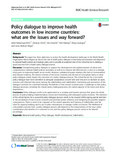| dc.description.abstract | This paper has three objectives: to review the health development landscape in the World Health Organization African Region, to discuss the role of health policy dialogue in improving harmonisation and alignment to national health policies and strategic plans, and to provide an analytical view of the critical factors in realising a good outcome from a health policy dialogue process.Strengthening policy dialogue to support the development and implementation of robust and comprehensive national health policies and plans, as well as to improve aid effectiveness, is seen as a strategic entry point to improving health sector results. However, unbalanced power relations, the lack of contextualized and relevant evidence, the diverse interests of the actors involved, and the lack of conceptual clarity on what policy dialogue entails impact the outcomes of a policy dialogue process. The critical factors for a successful policy dialogue have been identified as adequate preparation; secured time and resources to facilitate an open,inclusive and informed discussion among the stakeholders; and stakeholders’ monitoring and assessment of the dialogue’s activities for continued learning. Peculiarities of low income countries pose a challenge to their policy dialogue processes, including the chaotic-policy making processes, the varied capacity of the actors and donor dependence.Policy dialogue needs to be appreciated as a complex and iterative process that spans the whole process of policy-making, implementation, review and monitoring, and subsequent policy revisions. The existence of the critical factors for a successful policy dialogue process needs to be ensured whilst paying special attention to the peculiarities of low income countries and potential power relations, and mitigating the possible negative consequences. There is need to be cognisant of the varied capacities and interests of stakeholders and the need for capacity building, and to put in place mechanisms to manage conflict of interest. The likelihood of a favourable outcome from a policy dialogue process will depend on the characteristics of the issue under consideration and whether it is contested or not, and the policy dialogue process needs to be tailored accordingly. | en_US |

